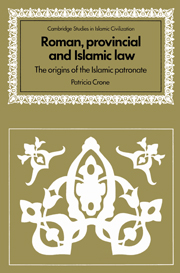2 - A practical guide to the study of Islamic law
Published online by Cambridge University Press: 16 October 2009
Summary
This chapter is intended for the non-specialist who wishes to acquire some familiarity with the nature of Islamic law before proceeding to the argument presented in this book. The specialist reader can go straight to the chapter on walā'.
Immutability
Islamic law is a divine law elaborated and transmitted by private scholars. Whatever the degree to which it had been controlled by caliphs in earlier times, law-finding had ceased to be a caliphal prerogative by late Umayyad times, and the role of the ruler in classical theory is limited to that of patronising scholars (‘ulamā’), appointing judges (qāḍīs), and ensuring that the law is applied. The Sharī'a is thus work of pure scholarship. This has two consequences of major importance.
The first is that the Sharīʽa is immutable. This may be thought to be a consequence of its divine nature, and to some extent it clearly is; but divine origins are not in themselves enough to secure immutability for a legal system. Thus caliphal law was divine law, yet it changed and was acknowledged to do so. Being mouthpieces of God himself, the caliphs could lay down such law as they wished: the law was unchanging only in the sense that it was God's law however much it changed. Unlike caliphs, however, scholars owe their authoritative status to their learning, not to an office or position independent of it: they are authoritative because they know what others have said.
- Type
- Chapter
- Information
- Roman, Provincial and Islamic LawThe Origins of the Islamic Patronate, pp. 18 - 34Publisher: Cambridge University PressPrint publication year: 1987

